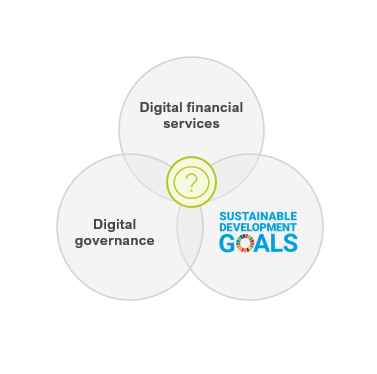The new nexus: digital governance, digital financial services and the SDGs
The new nexus: digital governance, digital financial services and the SDGs
9 June, 2021 •What is the New Nexus Initiative?
Cenfri, with support from GIZ and in collaboration with On Think Tanks, is hosting a series of digital dialogues to explore issues at the intersection of digital governance, digital financial services (DFS) and the Sustainable Development Goals (SDGs) across emerging economies. The digital meetups connect development partners, industry experts, academics, policymakers and regulators currently working at this nexus to identify and exchange knowledge on the key issues that decision-makers in emerging economies face in leveraging DFS as a contributor to the SDGs.
What are the key issues emerging from this nexus and how should we respond?

Why the focus on digital governance, digital financial services and the SDGs?
The concept of digital governance has emerged over the last decade as society grapples with the impact of new technologies and digital transformation of products, services and processes. Questions around how to deal with the impact of artificial intelligence, cybersecurity risks, cross-border digital platforms and digital currencies, among others, have become central to global and national policy. The financial sector has been at the forefront of many of these trends, as digital transformation reshapes the financial landscape – creating new risks but also opportunities for the contribution of DFS to the SDGs.
As regions around the world respond to these risks and opportunities, we want to create opportunities for dialogue (in the form of digital meetups) to better understand these topics in the context of the realities and challenges regulators of digital financial services in emerging economies are facing.
The first dialogues will cover:
- Responsible deployment of AI in financial services | 22 June 2021
- A tricky balance: Financial sector and data innovation and cybersecurity risks | 24 June 2021
- DFS for transparent supply chains | 29 June 2021
- Digital currencies and illicit financial flows |1 July 2021 (tbc)
While the digital meetups are each centered on a specific issue related to digital governance and DFS, a key focus across the dialogue series will be to identify the support that regulators of DFS in emerging economies need to ensure the contribution of DFS to the SDGs. Below, we set out some research questions as a starting point to explore and evolve with participants at the meetups.
Artificial intelligence (AI) and financial inclusion:
- To what extent is AI being used in financial services, especially in countries with limited data markets? What are the business models enabling the application of AI in financial services in these markets?
- Are there examples of AI use in financial services positively contributing to the SDGs?
- How are DFS regulators in emerging economies currently dealing with AI use in financial services?
- What regions are leading in AI regulation in DFS and what approaches are emerging? How could they impact other regions?
Cybersecurity and financial sector innovation:
- Are there specific cybersecurity risks associated with fintechs and non-traditional financial service providers like mobile money operators?
- What are some of the regulatory approaches that are being used to mitigate these risks?
- How can we avoid copy and paste regulation and ensure sound data protection without stifling financial sector innovation?
DFS and transparent supply-chains:
- Which supply-chains in emerging economies are likely to struggle with new transparency requirements? How do they differ by region?
- How can digital financial services and new technologies be leveraged to enhance transparency and supply a low-cost solution to ensure producers (particularly SMEs) are able to comply with these transparency obligations?
- What role can financial sector regulators play to enable DFS to contribute to transparency supply chains in emerging markets?
Digital currencies and illicit financial flows:
- What are the current ways digital currencies are used in emerging economies? What are the chief financial integrity concerns related to these use cases?
- Is AML / CFT regulation sufficient to mitigate these risks?
- What role might central-bank digital currencies (CBDC) play in mitigating these risks? Is there a role for CBDC to play in contributing to the SDGs?
What will it lead to?
A key output from the meetups will be a feedback symposium where Cenfri, GIZ and On Think Tanks will distill the key issues and solutions identified in the digital dialogues so that participants can use these to inform their future work in this space. We hope these meetups will be the first in a series of conversations.
How can you get involved?
These meetups are intended to be short, small (with a maximum of 25 participants) and interactive so that participants can share the approaches they are recommending or testing and, ideally, learn from each other. Participation in the meetups is by invitation. Please contact Marília Ferreira da Cunha marilia.ferreira.cunha@gmail.com if you would like an invitation to a specific meetup.
You can also get involved by following the conversation on our initiative webpage or connecting with karenk@cenfri.org via email if you would like to contribute to (or help answer) our research questions.
